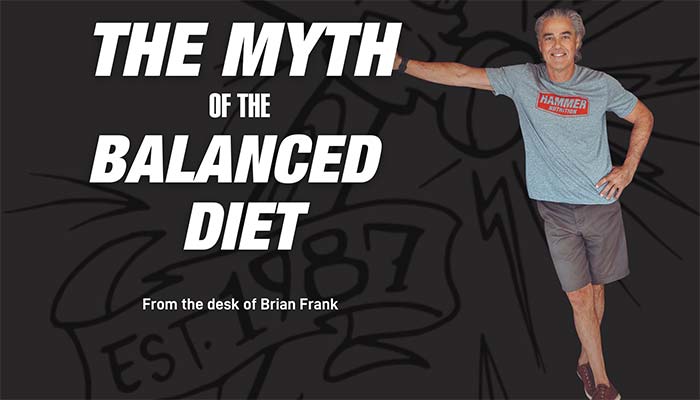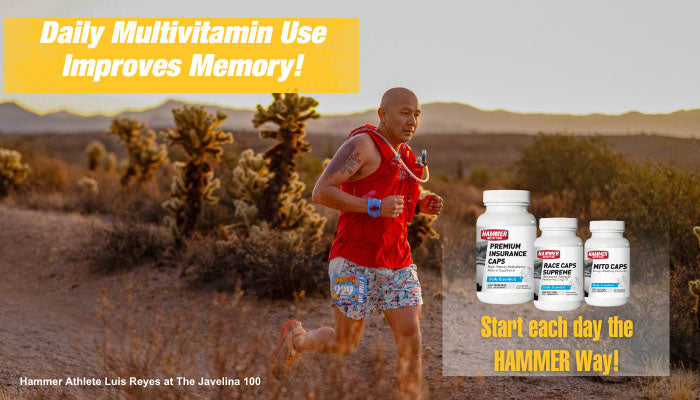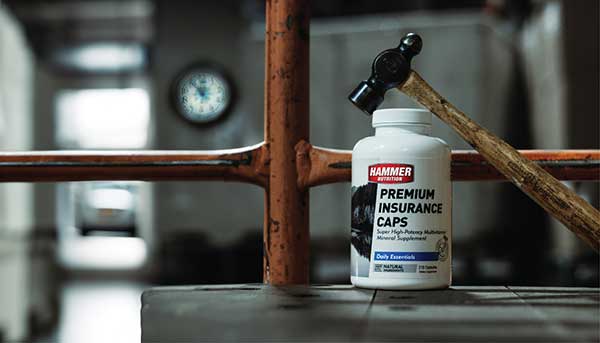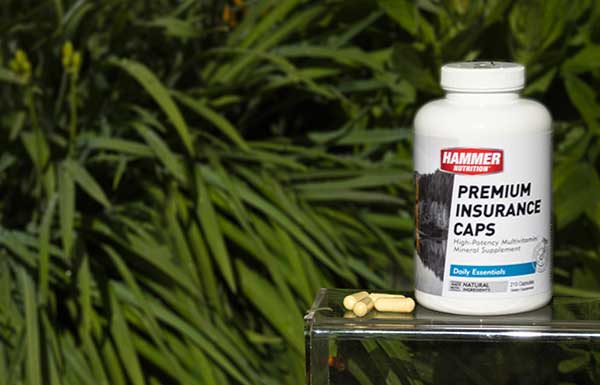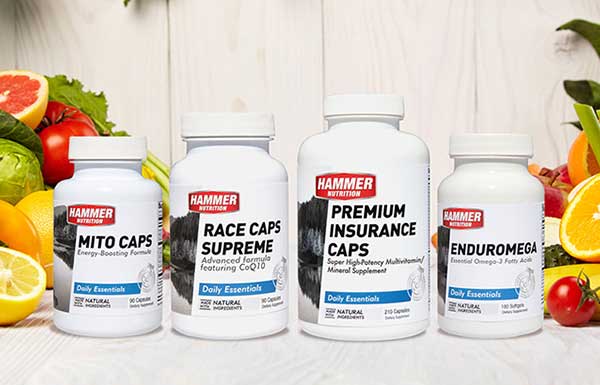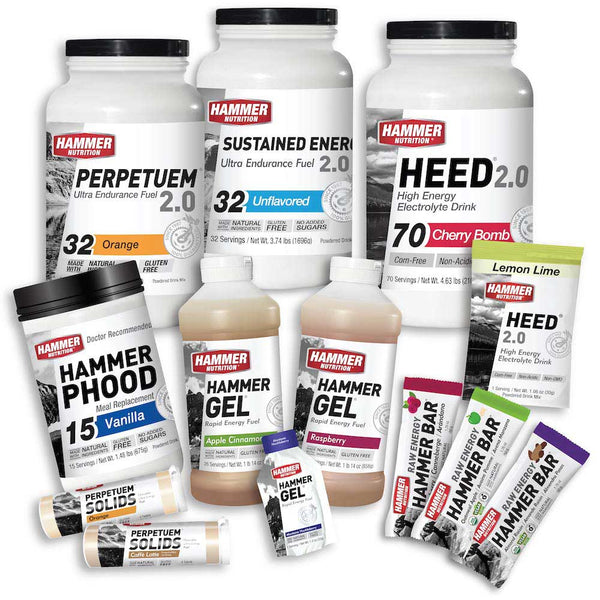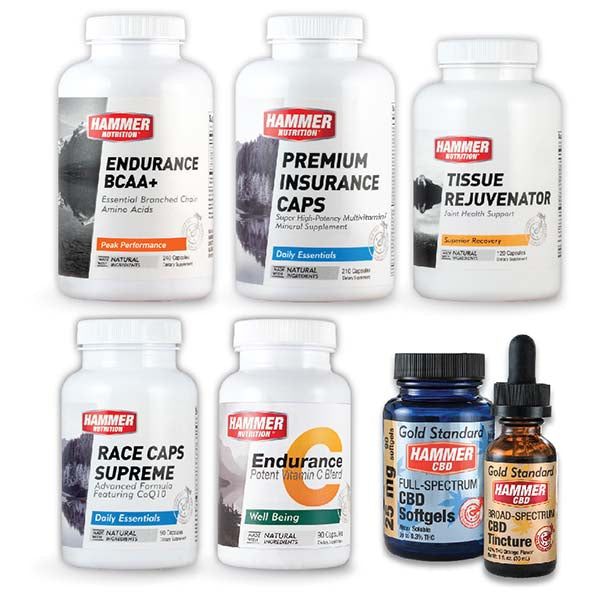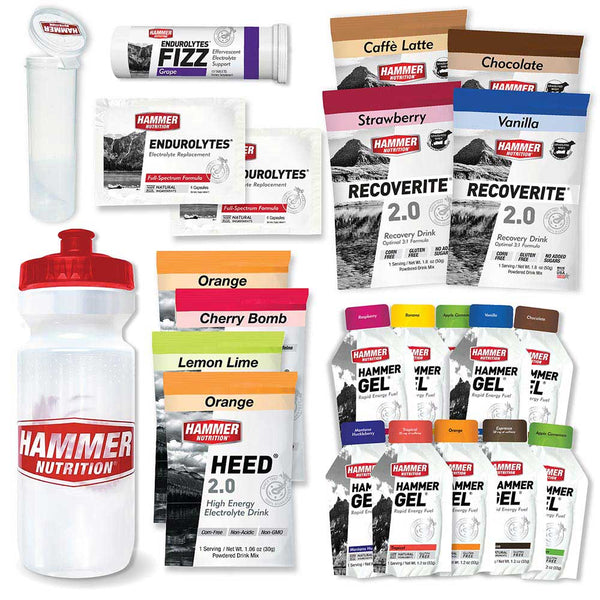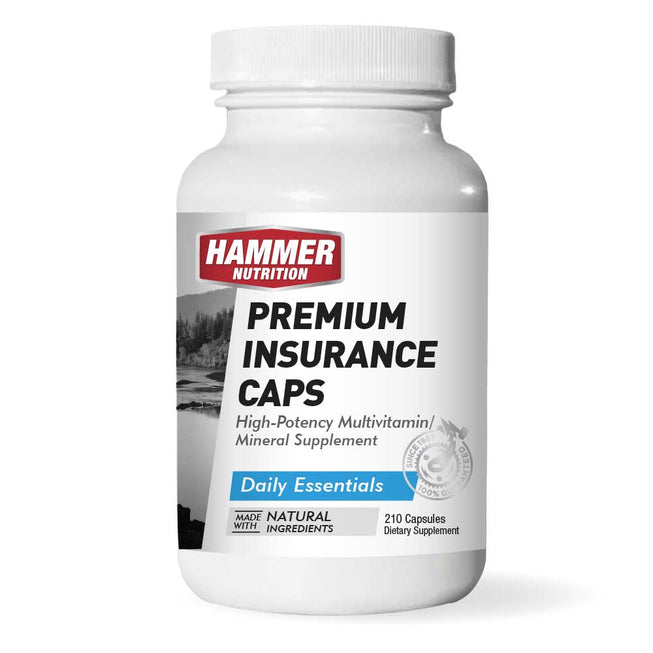
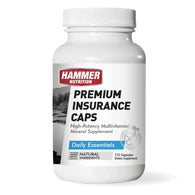
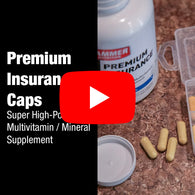
Premium Insurance Caps
- Supports optimum health
- Boosts energy all day
- Supports the defense system
- 1 month supply
Premium Insurance Caps are an essential part of the Daily Essentials Kit+
Quantity:



Improve your health, and your quality of life and performance will follow. Regular use of Premium Insurance Caps—Hammer’s potent multivitamin and mineral complex—brings about accelerated athletic recovery, greater fatigue resistance, reduced rates of illness and infection, and a general experience of wellness.
Premium Insurance Caps is formulated with only highly absorbable nutrients, in optimal amounts, to powerfully fill in nutrient gaps that are prevalent in the modern diet. It is the ideal “start here” supplement for hard-training athletes, active people, or anyone seeking to protect their health and maximize their energy.
- Why did you choose the four you did for the Daily Essentials Kits?
- Why should I choose Premium Insurance Caps?
- Does Hammer have a “collagen-enhancing" supplement?
- What are the benefits in taking Premium Insurance Caps?
- Why doesn’t Premium Insurance Caps contain iron?
- Why is my urine bright yellow after taking Premium Insurance Caps?
- Why is vitamin B5 not included in the Premium Insurance Caps?
- Am I getting too much vitamin E?
- Are your supplements 3rd party tested?
- What would you recommend to help in the healing process of a bone fracture?
- Why do Premium Insurance Caps seem to have a bit of a fishy smell?
- Why do I need to take a multivitamin/mineral supplement?
- How much manganese in Hammer products?
- Why are nutrients that used to be measured in International Units (IU) now measured in milligrams or micrograms?
- Do I need to be concerned with the amount of vitamin B6 in Premium Insurance Caps?
Why did you choose the four you did for the Daily Essentials Kits?
Q: Of all the products you make, why did you choose the four you did for the Daily Essentials Kits? And what do these products do?
A: Hammer Nutrition's Daily Essentials supplements—Premium Insurance Caps, Race Caps Supreme, Mito Caps, and EndurOmega—provide the widest range of benefits for both athletic performance and overall health purposes. They are the cornerstone of the Hammer Nutrition product line, and they should be the foundation of your supplement program. Take them every single day, whether training or not, and enjoy the tremendous benefits they provide.
WHAT THE DAILY ESSENTIALS DO FOR YOU
- Replenish vitamins and minerals, which athletes and active people deplete in greater amounts than sedentary people, to optimize overall health
- Support entire-body health by supplying a wide range of antioxidants to help neutralize free radicals and the cellular destruction they cause
- Provide key substrates to maximize efficient and consistent production of energy
- Optimize mitochondrial health, an absolute necessity for enhancing athletic performance and overall health
- Supply the body with the omega-3 fatty acids EPA and DHA, which are closely involved in numerous areas of human health
Premium Insurance Caps
Unlike many multis that contain inadequate Daily Value (DV) or Reference Daily Intake (RDI) amounts of nutrients (which are only the minimum standards for preventing nutrient-deficiency diseases), Premium Insurance Caps is formulated with Optimum Daily Intake (ODI) amounts of the highest quality vitamins and minerals. This supplies your body with the higher quantities of nutrients it needs for optimal health. Also included in the formula is an impressive array of complementary nutrients and digestive enzymes.
More about Premium Insurance Caps
Race Caps Supreme
The combination of nutrients in Hammer Nutrition’s premier product works synergistically to provide you with a plethora of dynamic athletic and general health benefits, unmatched by any other athlete-specific supplement. These include:
- Higher energy levels during workouts and all day long, without the unpleasant stimulant side effects that come from the ingredients in many other supplements
- Noticeable increase in endurance
- Less muscle soreness and enhanced recovery after training sessions
- Antioxidant support for optimal immune system function
Everyone will benefit greatly from the consistent use of Race Caps Supreme, and it's an absolute essential for athletes.
More about Race Caps Supreme
Mito Caps
The Mito Caps formula is based on the eye-opening studies of Dr. Bruce Ames regarding mitochondrial functioning, aging, deterioration, and regeneration. The importance of maintaining optimal functioning of the mitochondria is eloquently stated by Dr. Bill Misner: “The longer you can stimulate the lifespan or health of the mitochondria, the longer you may potentially live and the better you will perform in endurance events. The athlete who has the most healthy/efficient active mitochondria is the athlete who performs at their best.”
More about Mito Caps
EndurOmega
The premium-quality fish oil contained in EndurOmega supplies the body with the essential fatty acids (EFAs) eicosapentaenoic acid (EPA) and docosahexaenoic acid (DHA), both of which are vitally important for numerous aspects of athletic performance and overall health. These EFAs are required for life itself, in fact, so it’s no wonder they’re designated as “essential”! Our bodies cannot make EPA and DHA; supplementation with EndurOmega is the easiest, most efficient way to ensure you’re receiving adequate amounts of EPA and DHA.
More about EndurOmega
SUMMARY
The combination of the Hammer Nutrition Daily Essentials provides a tremendously wide range of benefits that support optimal athletic performance and overall health, a range that no other supplement combination can come close to matching. Available in money-saving kits, Premium Insurance Caps, Race Caps Supreme, Mito Caps, and EndurOmega are products that everyone, athlete and non-athlete alike, will benefit from. They should be the foundation of every daily supplement program, including yours!
Why should I choose Premium Insurance Caps?
Q: There a tons of multivitamin supplements on the market. Why should I choose Premium Insurance Caps?
A: Here are 5 reasons to choose Premium Insurance Caps:
- Optimum, not minimum, amounts. Unlike many vitamin/mineral supplements that contain inadequate Daily Value (DV), Recommended Daily Allowance (RDA), and Reference Daily Intake (RDI) amounts of nutrients, Premium Insurance Caps is formulated with Optimum Daily Intake (ODI) amounts of the highest quality vitamins and minerals. Dr. Shari Lieberman hits the nail on the head about why the use of ODI amounts in supplementation is so vital: "RDIs reflect amounts that are adequate to prevent nutrient-deficiency diseases, and are not tailored for individual needs. In order to attain a state of optimum health and disease prevention, we must take into our bodies optimum - not minimum - amounts of vitamins and minerals."
NOTE: Premium Insurance Caps contain superb levels of the B-complex vitamins, amounts that replicate many stress support formulas, thus making those products unnecessary in your supplement regimen. - Capsules, not tablets. The nutrients in Premium Insurance Caps are contained within a two-piece all-vegetable capsule; that means they will dissolve much more rapidly and thoroughly than tablets would, so your body will actually receive the nutrients you're consuming. Because tablets can take longer to break down, they often irritate the intestinal lining, causing major stomach discomfort. Additionally, tablets can pass through the entire digestive system only partially dissolved, or completely un-dissolved. Either way, your body does not get the full volume of nutrients you ingested, which means you're not getting what you paid for.
- Highly assimilated, amino acid-chelated minerals. For many minerals, there are several forms available, all with differing absorption rates. Some companies use inexpensive forms of minerals in their products (e.g., magnesium in the oxide form or calcium in the carbonate form). Unfortunately, these cheap forms are not as well absorbed as other forms, such as the amino acid chelates used in Premium Insurance Caps.
- Multiple digestive enzymes for maximum nutrient absorption. It's not what you consume, it's what you absorb. To aid the absorption of nutrients, Premium Insurance Caps includes digestive enzymes such as pepsin and papain.
- Only beneficial nutrients, no "salt and pepper" amounts. Some companies add auxiliary nutrients at levels that have no real value (what we call "salt and pepper" amounts). For example, some multivitamin/mineral supplements contain only 5 mg. of coenzyme Q10 and/or lipoic acid. Both are fantastic nutrients, but at that level you won't experience any true benefits. So even though a product's label may show a long list of auxiliary nutrients, you won't see results if the amounts are inconsequential. When you buy such a product, you're paying for a product that has little more than an impressive label. All the nutrients included in Premium Insurance Caps are at levels that will provide real benefits.
Does Hammer have a “collagen-enhancing" supplement?
We currently do not produce an actual collagen supplement, but there are a number of nutrients that are involved in the production of collagen:
1) Vitamin C (Endurance C) is vital in the production of collagen, and without this vitamin the body can’t form collagen. Research shows that "the presence of Vitamin C directly triggers DNA to regulate and maintain the intercellular amount of collagen." [1]
2) Zinc and Copper (Premium Insurance Caps) are both cofactors in the production of collagen.
3) The amino acids Lysine, Glycine, and Proline are all necessary for collagen production. On a gram-per-gram basis, Whey Protein has higher amounts of these three amino acids, though Organic Vegan Protein is not far behind.
4) The Type II Collagen in Tissue Rejuvenator is a protein that is made from chains of amino acids, including glycine and proline, both of which are mentioned in #3. The Horsetail Leaf in Vegan Tissue Rejuvenator is a plant source of the trace mineral silica, which aids in collagen production.
REFERENCE: https://www.sciencedirect.com/science/article/pii/B9780815515845500144
What are the benefits in taking Premium Insurance Caps?
Q: In addition to helping cover my vitamin and mineral needs, are there any other benefits in taking Premium Insurance Caps?
A: Here are two extraordinary benefits to be enjoyed by taking Premium Insurance Caps:
60%+ Reduction in the number of sick days!
In August 2020, the eye-opening results from a study were published in the journal Nutrients [1]. To this day it remains one of the most important studies in recent years, as researchers found that:
Compared to study participants taking a placebo, the participants who took a multivitamin/mineral supplement had a 60+% reduction in the number of sick days! Those same participants also reported fewer and milder illness-related symptoms! Profound? Eye-opening? You bet! Here are the highlights of this study:
- It involved healthy participants between 55 and 75 years of age.
- For 12 weeks, one group received a daily multivitamin/mineral supplement, while the other received an inactive placebo.
- Before and after this period, researchers measured the participants’ blood vitamin/mineral status and various markers of immune function.
- At the end of the study, the researchers noted that the participants who took the multivitamin/mineral supplement experienced an average of 2.29 sick days, while the placebo group averaged 6.43 days of illness.
- It was also noted that the multivitamin/mineral supplement group experienced fewer illness symptoms than the placebo group and that those symptoms were noticeably milder.
In the published report, researchers made some notable comments:
“Since multiple nutrients support immune function, older adults may benefit from multivitamin and mineral (MVM) supplements.” [2]
“Generally regarded as safe and readily available over the counter, dietary supplements have been used with few significant side effects in clinical studies.” [3]
“Although conflicting and contradictory studies exist, there is evidence suggesting that dietary supplementation with a combination of immunity-related micronutrients supports immune function and reduces risk or severity of infection. [3]
“Indeed, targeted supplementation with these vitamins and minerals may provide additional protection at doses higher than the U.S. recommended dietary allowance (RDA). [4]
REFERENCES:
[1] https://www.mdpi.com/2072-6643/12/8/2447/htm
[2] Maggini, S.; Pierre, A.; Calder, P.C. Immune Function and Micronutrient Requirements Change over the Life Course. Nutrients 2018, 10, 1531.
[3] Gombart, A.F.; Pierre, A.; Maggini, S. A Review of Micronutrients and the Immune System-Working in Harmony to Reduce the Risk of Infection. Nutrients 2020, 12, 236.
[4] Calder, P.C.; Carr, A.C.; Gombart, A.F.; Eggersdorfer, M. Optimal Nutritional Status for a Well-Functioning Immune System Is an Important Factor to Protect against Viral Infections. Nutrients 2020, 12, 1181
Daily multivitamin use slows cognitive against 60!
This remarkable research [1] concluded that taking a multivitamin/mineral supplement daily for three years is associated with a 60% slowing of cognitive aging. As most everyone knows, the brain is responsible for many functions that fall under the term “cognition”—thinking, learning, memory, attention, perception, processing information, and much more. It’s also important to know that cognitive aging and decline is not a disease, but instead a naturally occurring process.
While we may not be able to completely halt cognitive aging, we now know how we may be able to slow it down...way down!
This particular research on the effects of daily multivitamin/mineral use and cognitive function was a sub-study of a larger study that compared the effects of cocoa extract (500 mg/day cocoa flavanols) and a standard multivitamin/mineral supplement to placebo. The first part of the research focused on the effects of cocoa extract (CE) vs placebo on Global Cognitive Function (GCF) composite score, the overall summary of 19 separate tests and the primary method in determining overall cognitive function. The researchers then studied the effects of daily multivitamin/mineral use vs placebo on GFC.
While the CE findings were no different than placebo, there was a noticeable improvement in GFC composite score in the results for the multivitamin/mineral supplement vs. placebo. Lead study researcher, Dr. Laura D. Baker, states "Daily multivitamin-mineral supplementation appears to slow cognitive aging by 60% or by 1.8 years,” and that the results “may have important public health implications, particularly for brain health, given the accessibility of multivitamins and minerals, and their low cost and safety.”
REFERENCE:
[1] https://clinicaltrials.gov/ct2/show/NCT03035201
Why doesn’t Premium Insurance Caps contain iron?
Premium Insurance Caps does not contain iron because nearly all Americans, if they consume adequate calories via a balanced diet, obtain more-than-sufficient amounts of iron, negating the need for additional iron from supplements. Dr. Shari Lieberman recommends an Optimum Daily Intake (ODI) of 15-25 mg for men and 20-30 mg for women. It is very easy to exceed these values from food alone. If an athlete consumes excessive amounts above Recommended Daily Allowance (RDA) levels of dietary iron—which ranges from 8 - 27 mg daily, depending on gender and age—they may experience premature fatigue and, potentially, more serious general health issues.
According to a well-respected source, "Most people have too much iron in their body. Excess iron generates massive free radical reactions. Human epidemiological studies show that those with high iron levels are far more likely to contract cancer and heart disease. A growing body of evidence implicates iron in neurological disorders such as Parkinson's disease."
Iron is an extremely important nutrient, especially for endurance athletes. An iron deficiency can negatively affect oxygen transport to the muscles if below-levels of hemoglobin are detected. An iron deficiency can also impair energy production if myoglobin and mitochondrial enzymes are sub-normal. However, too much iron can cause serious health issues, as outlined above.
If you aren't sure about your iron status, a CBC (Complete Blood Count)/Chemistry Profile blood test will determine what your iron status is and whether supplementation is necessary.
Why is my urine bright yellow after taking Premium Insurance Caps?
The Vitamin B2 (riboflavin) in Premium Insurance Caps is the reason for the bright yellow color change in urine. Among its many functions, riboflavin helps co-enzymes break down carbohydrates, protein, and fats. As the flavins in riboflavin are utilized in the body to metabolize carbs, fats and protein they pass along flavin rings which have a neon yellow color. That’s why urine is a brighter yellow color after taking Premium Insurance Caps and especially after consuming carbs, protein, and fats, It is NOT "peeing out all your vitamins" or “creating expensive urine” as some would lead you to believe. When you see your urine turning yellow it just means that the flavins in riboflavin are doing their job in metabolizing carbs, protein, and fat. This effect from riboflavin is completely normal and harmless.
Why is vitamin B5 not included in the Premium Insurance Caps?
Q: Why is vitamin B5 not included in the Premium Insurance Caps? Is B5 not a necessary part of B-Complex?
A: Vitamin B5 is pantothenic acid, and on labels of multivitamin/mineral supplements, oftentimes the latter is the one that is used. Every 7-capsule dose of Premium Insurance Caps contains 100 mg of pantothenic acid/vitamin B5.
Am I getting too much vitamin E?
Q: I noticed that there’s vitamin E in Premium Insurance Caps, Race Caps Supreme, and Mito Caps. If I’m taking all three products, will I be getting too much?
A: The answer to this question requires a bit of information, but the short answer is “no”, you won’t be oversupplying your body with too much vitamin E.
There are numerous studies, far too many to list even a fraction of them, that show that Optimum Daily Intake (ODI) amounts of vitamin E supplementation have multiple benefits. Still, there are some who believe that higher vitamin E intake is unnecessary and may, in fact, be detrimental. Dr. Bill Misner suggests otherwise, stating, "The only warning for limiting Vitamin E intake is if you are taking a prescription anticoagulant. In that case, you should follow your physician's counsel. The therapeutic dosage of Vitamin E commonly used by athletes seeking to prevent free radical damage during and following exercise is 1,200 IU per day. Dosages of up to 3,200 IU of Vitamin E have been used daily in a wide variety of subjects for periods of up to two years without any unfavorable side effects occurring.”
Vitamin E has many, many benefits including:
- Maintaining cell membrane integrity and helping reduce cellular aging
- Acting as a fat-soluble free radical scavenger
- Maintaining healthy platelet aggregation
- Protecting ocular (eye) health
- Helping delay cognitive decline
- Enhancing immune function
All of the above-listed reasons are why this important vitamin exists in Premium Insurance Caps, Race Caps Supreme, and Mito Caps. It’s important to remember that your body will be depleting vitamin E as it neutralizes free radicals, and also as it donates an electron to a “used up” antioxidant such as the coenzyme Q10 in Race Caps Supreme and the R-alpha lipoic Acid in Mito Caps, effectively renewing its antioxidant properties and capabilities (the is one of the main reasons why vitamin E is in Race Caps Supreme and Mito Caps). This means that your body is not storing all the vitamin E you're ingesting, but rather using it up as it utilizes its antioxidant properties (donating part of its molecular structure) in counteracting the negative effect caused by free radical production and accumulation, as well as regenerating used up/electron-missing antioxidants.
Each capsule of Premium Insurance Caps supplies approximately 38.22 mg/57 IU of vitamin E (d-alpha tocopherol), each capsule of Race Caps Supreme supplies 89.33 mg/133 IU, each capsule of Mito Caps supplies 8.33 mg/12.5 IU.
On a daily basis, if you are taking (for example)…
- 4 Premium Insurance Caps
- 2 Race Caps Supreme
- 2 Mito Caps
… you are consuming approximately 348 mg/519 IU of vitamin E per day. The Optimum Daily Intake (ODI) for vitamin E is 400 - 1200 IU daily. I believe that 400 - 800 IU daily is a sufficient amount for general health purposes, with the lower amount being adequate for sedentary people. For athletes, however, because they are generating several times more free radicals than sedentary people do, an amount upwards of 1200 IU daily is rational.
Are your supplements 3rd party tested?
Yes, every Hammer Nutrition supplement is 3rd party tested in compliance with the FDA’s regulations, 21 CFR Part 111 – Dietary Supplements. All the raw materials for each supplement we produce are tested for purity, strength, identity, and integrity. In addition to raw material testing, every Hammer Nutrition supplement is also tested in every stage of production—blending, encapsulation / powder-filling, packaging components and finished goods—before being released for distribution.
What would you recommend to help in the healing process of a bone fracture, and also to maintain bone strength going forward?
Here are the following supplements that will be really helpful in not only fully healing the bone, but to strengthen it more and more.
1) Premium Insurance Caps. Many nutrients contribute to bone health, and, of course, overall health. Vitamin C, vitamin D, vitamin B6, magnesium, calcium, selenium, zinc, and more play a bone-healing role. Suggested dose: 2 capsules 2-3 times daily.
2) Essential Mg. For too long, people have been under the impression that taking lots and lots of calcium was necessary to help with bone healing and also to help prevent osteoporosis. And while calcium is indeed an important nutrient, it's actually magnesium that is the most important... and for a slew of reasons in addition to bone health. It is so important, in fact, that we’ve included an article regarding magnesium's role in bone health...
Magnesium – Mightiest Mineral for Bone Health
By: Steve Born
In Endurance News #103, I wrote about an article that discussed the importance of magnesium in maintaining optimal bone health (Magnesium: The most important mineral for bone health). The bottom line was that while calcium, vitamin D, and a couple other nutrients certainly play a role in bone health, I believe that it is magnesium that is “driving the train.” A portion of the article states:
A strong case can be made for magnesium as the most important component for bone health instead, especially because magnesium is necessary for the proper utilization of vitamin D and calcium.
Dr. Susan Brown writes, “Since magnesium participates in an astonishing array of biochemical reactions, it’s no surprise that it’s essential for healthy bones. Most notably, adequate magnesium is essential for absorption and metabolism of calcium.”
More recent research appears to confirm this rationale. A study [1] conducted by researchers from the Universities of Bristol and Eastern Finland showed that higher serum levels of magnesium greatly decreased the risk of bone fractures.
The researchers followed nearly 2,250 middle-aged men over a 20-year period and found that the risk of having a bone fracture—particular a fracture of the hip—was decreased by an astounding 44% in men with higher blood levels of magnesium. Researchers also noted that the 22 men with the highest magnesium levels had no incidence at all with bone fractures over the entire 20-year period.
Lead researcher, Dr. Setor Kunutsor, states: "The findings do suggest that avoiding low serum concentrations of magnesium may be a promising though unproven strategy for risk prevention of fractures."
While magnesium arguably being the key mineral for bone health—including the very real potential for helping prevent fractures—may be news for some, magnesium expert, James South, wrote about it decades ago. In his hallmark article “Magnesium, The Key to Health and Life,” and referencing the work of Dr. Guy Abraham from the early 80’s, South writes:
"Magnesium stimulates release of the hormone calcitonin, which drives calcium into the bones where it belongs, and out of the soft tissues where it doesn't. A high-calcium, low-magnesium diet and cellular environment will thus tend to favor calcification of soft tissues as osteoporosis gradually develops. Abraham points out that Asian and African diets are low in calcium (300 to 500 milligrams daily), yet high in magnesium, and osteoporosis is not more common in Asia and Africa than in Europe and America, where daily calcium intakes from high-dairy diets are often 800 to 1,000 milligrams daily, combined with low magnesium."
Abraham notes, "When patients with severe osteoporosis were given massive doses of calcium they went into positive calcium balance, but radiographic studies revealed no change in the osteoporotic process. Where did that calcium go? Obviously into the soft tissues where it does not belong.” Abraham adds, “Magnesium has a calcium-sparing effect and decreases the need for calcium.” [2]
This exciting new research, along with previous studies, confirms the key role that magnesium plays in bone health.
As I’ve mentioned before, “Unfortunately, while magnesium is contained in a variety of foods, the overall degradation of our food supply has caused the average American intake to decline to amounts significantly below Optimum Daily Intake (ODI) levels. Therefore, to ensure you’re obtaining adequate amounts of magnesium, select foods that contain substantial levels of this vital mineral (seeds and nuts are good sources), and augment your intake with additional amounts of magnesium via supplementation.
Essential Mg contains five forms of highly bioavailable magnesium. From supporting optimal bone health to so much more, Essential Mg is an ideal way to ensure that you’re receiving optimal amounts of this all-important, health-benefiting mineral.
REFERENCES:
[1] Setor Kwadzo Kunutsor, Michael Richard Whitehouse, Ashley William Blom, Jari Antero Laukkanen. Low serum magnesium levels are associated with increased risk of fractures: a long-term prospective cohort study. European Journal of Epidemiology, 2017; DOI: 10.1007/s10654-017-0242-2
[2] Abraham G. The calcium controversy. J Appl Nutr 1982, 34:69-73.
Suggested Dose: 2 Essential Mg in the morning, 1 at lunchtime or early afternoon, and 1-2 at bedtime (at night, magnesium is very helpful for helping the muscles and nerves relax).
3) EnDuro D. There are far too many benefits of vitamins D3 and K2 to include here, so I’d encourage you to read the article New Product Alert - EnDuro D, as it provides more detailed information about this all-important product. Regarding bone health, the benefits from vitamin D3 supplementation are to support proper utilization of calcium to optimize bone density and overall bone health. Vitamin K2 works with vitamin D3 for supporting bone health by activating a protein called osteocalcin, which helps keep calcium out of the arteries while increasing the amount of calcium in the bones (teeth as well). Suggested Dose: 1 capsule is a sufficient amount on a daily basis. For bone repair, 1 capsule twice daily is suggested.
4) Boron. This trace mineral is extremely important for many aspects of health, and it is vitally important for maintaining and improving bone health because of the role it plays in assisting with the bone-building effects of calcium, magnesium, and vitamin D. Studies show that adequate intake of boron reduces the loss of calcium and magnesium excreted in the urine. That ensures that more of these two important minerals stay in the body. Suggested Dose: Exactly the same as EnDuro D.
5) Whey Protein. A lot of people don’t think about protein when it comes to bone health, but this bit should convince otherwise. Bone can be imagined as being somewhat like a sponge made of living protein upon which mineral crystals are embedded. By volume, roughly half of bone is comprised of protein. When a fracture occurs, the body is called upon to gather protein building blocks together to synthesize a new structural bone protein matrix. In addition, protein supplementation increases growth factors like insulin-like growth factor-1 (IGF-1), a polypeptide that exerts a positive effect on skeletal integrity, muscle strength, immune response, and bone renewal. Protein malnutrition or under-nutrition leads to a “rubbery” callus, compared to the rigid calluses of those with adequate or high protein intake. Numerous studies document the acceleration of fracture healing with even a modest 10- to 20-gram increase in protein intake. The benefits of supplemental protein are important to everyone and especially important to those with malnutrition or low baseline protein intake. In fact, among elderly hip fracture patients, poor protein status at the time of fracture predicts fracture outcome. Those with low protein status take longer to heal, and have more complications, including death.
Specific amino acids of special importance include lysine, arginine, proline, glycine, cystine, and glutamine. Lysine, for example, is known to enhance calcium absorption, increase the amount of calcium absorbed into the bone matrix, and aid in the regeneration of tissue.
Suggested Dose: 1 scoop of Hammer Whey protein mixed in water only at bedtime + an optional dose of ½ to 1 scoop mixed in water with added fruit (smoothie) during the day will prove to be highly beneficial for bones, muscles, and immune system.
6) Tissue Rejuvenator. While not directly related to bone health, the nutrients in Tissue Rejuvenator will provide potent benefits for alleviating soreness, aches, and swelling, while also helping strengthen all of the connective tissue surrounding the bones. Suggested Dose: 2 capsules twice daily is our suggestion.
7) LSA Caps. This product, as well as Premium Insurance Caps, contains this trace mineral. The roles selenium plays in bone health are complex, but it is believed that a portion of its importance comes via its antioxidant properties. As part of the glutathione peroxidase antioxidant enzyme, selenium helps neutralize reactive oxygen species (ROS) free radicals. Levels of selenium that are too low can lead to higher ROS levels, which is considered to be a primary culprit in the development of osteoporosis. Low levels of selenium at also associated with lower bone mineral density (BMD), which decreases bone strength and increases the risk of fractures and osteoporosis. Suggested Dose: 2-4 capsules of Premium Insurance Caps (57 - 86 mcg) and 4 capsules of LSA Caps (100 mcg) daily will supply you with an ideal amount of selenium.
Why do Premium Insurance Caps seem to have a bit of a fishy smell?
Unlike previous incarnations of Premium Insurance Caps, you may notice that the most updated formula has a strong, medicinal-like to an almost fish-like odor. So where exactly is that smell coming from?
Part of it is due to the B vitamins, which have a naturally strong, medicinal-like smell (open a bottle of a "stress formula" product, which is basically a combination of all of the B vitamins and some vitamin C, and you'll most likely notice a similar smell). Our manufacturer confirmed this while adding that one of the substances in the product, Betaine Hydrochloride (Betaine HCL), also has a naturally strong odor, one that can very much be described as "fish-like". Betaine HCL is included in the Premium Insurance Caps formula to aid in the absorption of protein and certain vitamins and minerals such as vitamin B12 and calcium. Again, the medicinal-to-fish-like smell that comes from this particular nutrient—as well as the B vitamins—is completely natural and normal.
Why do I need to take a multivitamin/mineral supplement?
Q: Why do I need to take a multivitamin/mineral supplement if I’m eating a balanced diet?
A: The reason why we highly recommend supplementing with a multivitamin/mineral supplement—Premium Insurance Caps is an outstanding product—is because you cannot obtain all the nutrients your body requires solely from your diet. Here's why:
- There has never been a single clinical study that documents what comprises a balanced diet nor one that has demonstrated one's ability to meet basic nutrient requirements through whole foods alone.
- Studies show that food alone does not supply all the micronutrients we need to prevent deficiency, let alone achieve optimal health. Nutritional scientist, Bruce Ames, bluntly states, “Inadequate dietary intakes of vitamins and minerals are widespread, most likely due to excessive consumption of energy-rich, micronutrient-poor, refined food. Inadequate intakes may result in chronic metabolic disruption, including mitochondrial decay.” Another study concluded: "Nearly the entire U.S. population consumes a diet that is not on par with recommendations.”
- Very few of us have routine access to fresh, locally grown foods. Much of our diet comes from foods grown far away, picked when unripe, and then sent packing. Nutritional content is questionable and usually depleted.
- Even if we could obtain all the nutrients we need from our diet, it's highly unlikely that any of us eats an ideal diet as consistently as we think we do. The USDA states: “To promote your health, eat a variety of fruits and vegetables—at least 2 servings of fruits and 3 servings of vegetables—each day” but really, how many of us do that with any kind of consistency? And that figure may be on the low side, thanks to research from Dr. Dagfinn Aune, who concludes, “Our results suggest that although five portions of fruit and vegetables is good, ten a day is even better.”
That said, please understand that we’re not suggesting that you can neglect your diet, take scads of pills, and have all of your nutrient needs covered. Supplements should never take priority over the consumption of a healthy diet. At Hammer Nutrition we emphasize both quality nutrition and supplementation. First and foremost, your primary nutritional goal is to consistently consume a healthy diet, which means:
- Eating whole grains and locally grown organic fruits and vegetables as much as possible.
- Avoiding packaged, processed foods and junk foods, and foods containing artificial sweeteners, colors, flavors, and preservatives
- Minimal sodium and low-to-no simple sugars
The main reason to try and eat the healthiest diet possible—primarily a variety of fresh fruits and vegetables—is NOT so much for their vitamin and mineral content, which is minimal, at best, but instead for the nearly countless health-benefiting phytochemicals that are only found in fruits and vegetables. For example, research has shown that a naturally occurring flavonoid found in various fruits (mainly strawberries) called fisetin has strong antioxidant, neuroprotective, and cardio-protective properties. Eating lots of strawberries will help you get sufficient amounts of this amazing phytonutrient.
Bottom line: If you want to look, feel, and perform your best, the first step is always a diet dominated by nutrient-dense whole foods. But that alone will no longer suffice—supplementation has become a part of modern life. To augment the minimal amounts of vitamins and minerals supplied in the daily diet, and to obtain ideal amounts of these vitally important nutrients, you must supplement. If you want to achieve your best performances in your exercise sessions and events—and, even more importantly, enjoy optimal health (not minimal, optimal!)—then daily supplementation is a necessity, not an option.
How much manganese in Hammer products?
Q: Why do some of your products contain what seems to be a high amount of manganese, especially when the upper limit for daily intake of manganese is 11 mg.
A: For the most part, the Upper Intake Level (UL)—as it is for other medical/government standards such as the RDA, RDI, and DV—is a standard intended for the general population, and not really applicable for athletes who use/deplete these nutrients at a much higher level than sedentary people do.
When athletes take in nutrients like manganese and the others in an electrolyte product, these nutrients don’t just accumulate, stacking up higher and higher until they reach and exceed UL amounts. Instead, these nutrients—manganese included—are used (and thus, used up) to perform many important bodily functions that occur during exercise. Put another way, when we use a product like Endurolytes Fizz, for example, we are simply resupplying the body with nutrients that it has used up internally to perform the actions they do and/or that are lost in sweat and urine.
Manganese plays an important role as part of the natural antioxidant enzyme superoxide dismutase (SOD), which helps protect against the damage caused by free radicals. Dr. Bill Misner writes, “Manganese is necessary in trace amounts for optimal muscle cell enzyme reactions for the conversion of fatty acids and protein into energy. Researchers suggest that manganese deficiency plays a vital role in glucose tolerance factor (which acts as a physiological enhancer of insulin activity), free radical build-up from intense exercise, and nerve function disorders, especially in older athletes. Endurance exercise increases the rate manganese is lost from the body. Also, please note [there are] three inhibiting minerals—calcium, magnesium, potassium—in both HEED and the Endurolytes products that reduce total absorption rate of manganese.”
Dr. Misner goes on further to state, "You lose (without exercise) an average of 4 mg of manganese from the body each day in the feces (via bile). Typically, when orally dosed, only 3-5% of Manganese is absorbed into the body."
Therefore, because of the role manganese plays in a number of bodily functions during exercise...
- Maximizing muscle cell enzyme reactions for the conversion of fatty acids and protein into energy
- Supporting optimal utilization of insulin
- Protecting against free radical damage via its involvement in the production of SOD
... plus, the fact that absorption rates of orally dosed manganese are extremely minimal, and are also inhibited somewhat by the calcium, magnesium, and potassium components in many of our fuels, we believe that the small amount of manganese we include in them is absolutely merited.
With the Optimum Daily Intake (ODI) of manganese set, as per Dr. Nancy Lieberman, at 15 mg to 50 mg per day, and taking into account that ingested manganese is "used up" during exercise (both for energy-production purposes and antioxidant support), as well as being depleted via sweat and urine, we are convinced that the amounts of manganese we use in our products are not only merited, but extremely beneficial. In fact, highly regarded sports scientist, Dr. Michael Colgan, writes, "Because of their greater bone and soft tissue turnover and their higher metabolism of glucose, athletes may need more manganese than sedentary folk." Now, if someone is sedentary and not exercising, this much manganese is not necessary.
As far as toxicity is concerned, Dr. Lieberman states, "The toxicity for manganese is low when it is ingested in the form of either manganese-rich foods or supplements. Toxicity can occur, however, when manganese is inhaled, as in the case of certain miners who are exposed to high concentrations of manganese oxide in the air." Dr. Michael Colgan elaborates, "Manganese is considered one of the least toxic of the trace elements if taken by mouth."
Our position is that athletes and active people do require a bit more manganese than do sedentary people (though again, Dr. Lieberman's ODI for the general population is set at much higher 15-50 mg/day). With manganese being utilized and thus depleted during exercise for a number of reasons (not simply ingested and stored), we believe that the small amount of manganese in not only merited, but tremendously beneficial.
Hammer Nutrition products containing manganese
- Endurolytes – 0.25 mg per capsule
- Endurolytes Fizz – 3.0 mg per tablet
- Endurolytes Extreme – 1.0 mg per capsule
- Endurolytes Extreme Powder – 0.5 mg per scoop
- HEED – 2.0 mg per scoop
- Recoverite – 2.9 mg per 2-scoop serving
- Organic Vegan Recoverite – 0.6 mg per 2-scoop serving
- Premium Insurance Caps – 1.07 mg per capsule
On a personal note, my (Steve Born) last big thing in my chosen sport of ultramarathon cycling was a record attempt that saw me on my bike for 75.5 hours. I used the original Endurolytes product at a dose of 3-6 capsules per hour, depending on the weather conditions through the Mojave Desert. After successfully completing the record attempt, I calculated that I took in somewhere between 300 and 340 Endurolytes capsules, which means I was intaking 75 – 85 milligrams of manganese. Nothing even close to a toxic response ever occurred, and it was never anything that I was concerned about, the reason being that I knew that I was simply replenishing what my body had used up internally and/or sweated out.
Why are nutrients that used to be measured in International Units (IU) now measured in milligrams or micrograms?
Q: Why are nutrients that used to be measured in International Units (IU) now measured in milligrams or micrograms, and what is the difference between these two measurements?
A: International Units (IU) was historically used to measure vitamin A, beta-carotene, vitamin D, and vitamin E. However, the United States Food and Drug Administration (FDA) required that supplement facts labels change IU to metric units, which is why you now see milligrams (mg) or micrograms (mcg).
It’s important to know that even though there is a new standard of measurement, the amounts of the nutrients have not changed in any of the affected Hammer Nutrition products.
Beta-Carotene – 1 IU = 0.6 mcg beta-carotene
Example: 7-capsule dose of Premium Insurance Caps contains 7,500 IU of beta-carotene, now expressed as 1800 mcg of beta-carotene.
Vitamin E – 1 IU = 0.67 mg vitamin E (d-alpha tocopherol)
Example: 3-capsule dose of Race Caps Supreme contains 400 IU of vitamin E, now expressed as 268 mg.
Vitamin D – 1 IU = 0.025 mcg
Example: 1 softgel of EnDuro D contains 2,000 IU of vitamin D, now expressed as 50 mcg.
Do I need to be concerned with the amount of vitamin B6 in Premium Insurance Caps?
As you read the following information, it will show that there should be no issue at all with the amount of vitamin B6 in Premium Insurance Caps, even at a 7-capsule dose (100 mg of B6). However, if you have an individual or family history of neuropathy issues, especially severe and/or ongoing ones, we recommend sharing this information with your primary health care professional, and receive their approval, prior to using Premium Insurance Caps.
Dr. Michael Colgan wrote about vitamin B6 in his book Optimum Sports Nutrition [Advanced Research Press]. He writes: "The third nutrient to receive a media thrashing for purported toxicity is vitamin B6. Taken in large amounts (500 mg to 5 grams) for months or years, vitamin B6 does cause severe nerve damage [1, 2]. These huge overdoses are usually self-administered by women who have read popular articles on the use of vitamin B6 to treat premenstrual syndrome."
References:
[1] Anderson TW. Acta Vitamin Ezymologica 1977;31:43
[2] Haskell BE. Toxicity of vitamin B6. In: Effects of Nutrient Excesses and Toxicities in Animals and Man. Boca Raton, FL: CRC Press, 1978
In her book The Real Vitamin & Mineral Book [Avery Publishing Group], Dr. Shari Lieberman (who designed/developed the Optimal Daily Intake standard) writes, "For optimum general health, the basic Optimal Daily Intake for vitamin B6 is 25-300 mg for men and women." Dr. Lieberman suggests dosages for specific conditions such as anxiety (100-500 mg), asthma (50-300 mg), and emotional or physical stress (100-500 mg). Interesting to note that last one as our clients are certainly in the category of having physical stress and/or both physical & emotional stress.
As far as toxicity, Dr. Lieberman writes, "B6 is relatively nontoxic, but some problems with the nervous system have been reported. This occurs only with huge doses of 2,000 to 6,000 milligrams of B6 daily, although there are isolated cases of toxicity with smaller doses. These side effects appear to be reversible when the dosage is discontinued."
Additionally, the following text appears in the International Journal for Vitamin and Nutrition Research 58 (1988): 105-188 – "There are many reports stressing the absence of toxic side effects of vitamin B6 at doses up to 500 milligrams. In the strictly scientific sense, no causal relationship between pyridoxine [vitamin B6] and neuropathy has been demonstrated. It would appear that long-term administration of up to 200 milligrams daily may still be considered safe."
Lastly, Dr. Bill Misner wrote the following…
PYRIDOXINE B6 UPPER TOLERABLE INTAKE LEVEL (UL)
The Food and Nutrition Board of the Institute of Medicine established an upper tolerable intake level (UL) for vitamin B6 of 100 mg per day for adults (Institute of Medicine. Food and Nutrition Board. Dietary Reference Intakes: Thiamin, riboflavin, niacin, vitamin B6, folate, vitamin B12, pantothenic acid, biotin, and choline. National Academy Press. Washington, DC, 1998). In humans, a 100 mg dose will produce a plasma peak in 2-hours with a subsequent half-life of 8 hours. Add to this equation, exercise-induced fluid loss of the water-soluble vitamin B6 from energy expenditure, there are no toxicity issues with less than 20% of the upper ODA (a.k.a. ODI) therapeutic dose. Toxicity effects associated with Vitamin B6 may begin to manifest in isolated hypersensitive subjects when amounts greater than 500 mg per day are supplemented."
Take a look at that again... A dose of 100 mg peaks in plasma in two hours, with a half-life of eight hours. In other words, it doesn't have a terribly long "life span" in the body. Now, take into account vitamin B6 losses both from fluid (urine) and from exercise energy expenditure, and you can see why the Optimal Daily Intake dose is in the range of 100-500 mg daily, which is why we include 100 mg in every 7-capsule packet of Premium Insurance Caps.
My (Steve’s) position reflects that of Drs. Colgan, Lieberman, and Misner. Vitamin B6 is a water-soluble vitamin, rapidly depleted during times of stress, which exercise most certainly is. In addition to its requirement for over four-dozen enzymatic reactions/processes involving the metabolism of carbohydrates, protein, and fats, adequate amounts of vitamin B6 are required for coenzyme Q10 biosynthesis, CoQ10 being one of the most important substrates for energy production. For athletes, active people, or for those with specific health conditions, such as those Dr. Lieberman lists, I believe the Optimal Daily Intake amounts that Dr. Lieberman suggests are merited.
Dr. Misner followed up my response with this email to a client...
Amongst endurance athletes, water soluble B vitamins—especially B1, B2, B3, B6, Folate, and B12—are depleted proportionate to caloric expense. I hypothesize that 90% of all endurance athletes are deficient in B vitamins. My research confirms this statement with the subjects whose diets from food alone were analyzed.
B6 DEFICIENCY
Too little vitamin B6 or deficiency state occurs in certain subsets of the population. Individuals with a poor-quality diet, persons over age 40, or those whose intake is inadequate B6 for an extended period may benefit from taking a vitamin B6 supplement. Endurance athletes fit several subsets due to high carbohydrate and body fat calorie expense catabolized during exercise. Their diet fails to replace adequate B6, because high caloric expenditure during exercise fails to replace spent B6, hence the need for supplementation.
HOW MUCH B6 IS TOO MUCH?
Too much vitamin B6 can result in temporary nerve damage to the arms and legs. This neuropathy is usually related to a high intake of vitamin B6 from supplements, but it is reversible when supplementation is stopped. According to the Institute of Medicine, "Several reports show sensory neuropathy at doses lower than 500 mg per day" [1]. They established an upper tolerable intake level (UL) for vitamin B6 of 100 mg per day for all adults [1].
RATIONAL CONCLUSION
If 100 mg is a safe upper dose for a sedentary adult requiring 2000 calories per day to maintain lean body mass index, would not 100 mg B6 or more be rational for an endurance athlete requiring 4000 calories per day to maintain lean body mass index?
For further discussion of this question, kindly review "Dietary Supplement Fact Sheet: Vitamin B6" published by the Office of Dietary Supplements [2].
References
[1] Institute of Medicine. Food and Nutrition Board. Dietary Reference Intakes: Thiamin, riboflavin, niacin, vitamin B6, folate, vitamin B12, pantothenic acid, biotin, and choline. National Academy Press. Washington, DC, 1998.
[2] Office of Dietary Supplements, NIH Clinical Center, National Institutes of Health. "Dietary Supplement Fact Sheet: Vitamin B6" http://ods.od.nih.gov/factsheets/vitaminb6.asp#en12
Take 1–7 capsules daily with food as follows:
1–2 Capsules Daily with Meal
Ideal for children, young adults, and even those with an excellent whole foods-based diet.
3–4 Capsules Daily with Meal
The most common dosage for adults training fewer than 8–10 hours per week.
7 Capsules Daily Split Between 2 Meals
Super high-potency for high-volume exercise well over 10 hours per week.
PRO TIPS
Due to its calcium, selenium, and biotin contents, this product qualifies as a “women’s, pre-/post-natal formula.”
Allow 2–3 hours between the use of Premium Insurance Caps and the start of exercise.
Store in refrigerator or cool, dark place.
VITAMINS:
Vitamin A (as beta-carotene)
Vitamin B1 (thiamine)
Vitamin B2 (riboflavin)
Vitamin B3 (as niacinamide)
Vitamin B6 (as pyridoxine phosphate)
Vitamin B12 (as methylcobalamin)
Vitamin C (as calcium ascorbate)
Vitamin D3 (as cholecalciferol)
Vitamin E (as d-alpha-tocopherol)
Folate (as folacin)
Biotin (as d-biotin)
Pantothenic Acid (as d-calcium-pantothenate)
MINERALS:
Calcium (as AAC* and calcium ascorbate)
Iodine (as kelp)
Magnesium (as AAC*)
Zinc (as AAC*)
Selenium (as AAC*)
Copper (as AAC*)
Manganese (as AAC*)
Chromium (as Chromemate™)
Potassium (as AAC*)
Boron (as AAC*)
*AAC = Amino Acid Chelate
COMPLIMENTARY NUTRIENTS:
Bioperine™ – A trademarked standardized extract from the fruit of Piper nigrum (black pepper) or Piper longum (long pepper)
Pepsin – A proteolytic enzyme (helps breakdown protein)
Bromelain – An enzyme derived from pineapple
Papain – An enzyme derived from papaya
Phosphatidyl Serine – A phospholipid that contains both amino acids and fatty acids
PABA (para-amino benzoic acid) – A B-complex vitamin, also known as vitamin B10
Quercetin – A bioflavonoid found in onions, apples, leafy vegetables, and other food sources
Phosphatidyl Choline – A phospholipid bound to a choline particle
Inositol – A type of carbohydrate, also known as vitamin B8
Betaine HCL – A digestive enzyme containing betaine and hydrochloric acid
Citrus Bioflavonoids – Compounds found is citrus fruits
Proprietary Enzyme Blend (protease, amylase, glucoamylase, lipase, cellulase, phytase, maltase, and sucrose) – A blend of digestive enzymes
|
210 Capsules High-Potency Supplement Facts |
||
|---|---|---|
| Serving Size - 7 capsules | ||
| Amount Per Serving | % Daily Value* | |
| Vitamin A (as beta-carotene) | 1800mcg | 200% |
| Vitamin C (as calcium ascorbate) | 500mg | 556% |
| Vitamin D (as cholecalciferol) | 13mcg | 65% |
| Vitamin E (as d-alpha tocopherol succinate) | 269mg | 1793% |
| Thiamin | 100mg | 8333% |
| Riboflavin | 100mg | 7692% |
| Niacin | 100mg | 625% |
| Vitamin B6 (as pyridoxine phosphate) | 100mg | 5882% |
| Folate (5-MTHF) | 680mcg DFE (400mcg folic acid) | 170% |
| Vitamin B12 (as methylcobalamin) | 100mcg | 4167% |
| Biotin (as d-biotin) | 150mcg | 500% |
| Pantothenic Acid (as d-calcium pantothenate) | 100mg | 1000% |
| Calcium (as AAC** and calcium ascorbate) | 400mg | 31% |
| Iodine (as kelp) | 113mcg | 75% |
| Magnesium (as AAC**) | 200mg | 48% |
| Zinc (as AAC**) | 15mg | 136% |
| Selenium (as AAC**) | 100mcg | 182% |
| Copper (as AAC**) | 1mg | 111% |
| Manganese (as AAC**) | 7.5mg | 326% |
| Chromium (as Chromemate™) | 200mcg | 571% |
| Potassium (as AAC**) | 50mg | 1% |
| Boron (as AAC**) | 2.5mg | † |
| Bioperine™ (Piperine niger) | 5mg | † |
| Pepsin | 25mg | † |
| Bromelain | 25mg | † |
| Papain | 25mg | † |
| Phosphatidyl Serine | 50mg | † |
| PABA (para-aminobenzoic acid) | 100mg | † |
| Quercetin | 350mg | † |
| Phosphatidyl Choline | 100mg | † |
| Inositol | 100mg | † |
| Betaine HCL | 100mg | † |
| Citrus Bioflavonoids | 500mg | † |
| Proprietary Enzyme Blend (protease, amylase, glucoamylase, lipase, cellulase, phytase, maltase, and sucrase) | 25mg | † |
| * The Percent Daily Values are based on a 2,000 calorie diet. Your daily values may be higher or lower depending on your calorie needs. † Daily Value not established. ** AAC = Amino Acid Chelate |
||
| Other Ingredients: Rice Bran (Oryza sativa), Vegetable Capsule (plant cellulose, water) These statements have not been evaluated by the Food and Drug Administration. This product is not intended to diagnose, treat, cure or prevent any disease. |
||
|
120 Capsules Multivitamin Supplement Facts |
||
|---|---|---|
| Serving Size - 4 capsules | ||
| Amount Per Serving | % Daily Value* | |
| Vitamin A (as beta-carotene) | 1029mcg | 114% |
| Vitamin C (as Calcium Ascorbate) | 240mg | 267% |
| Vitamin D (as cholecalciferol) | 7mcg | 35% |
| Vitamin E (as d-alpha tocopherol succinate) | 147mg | 980% |
| Thiamin | 43mg | 3583% |
| Riboflavin | 54mg | 4154% |
| Niacin (as niacinamide) | 54mg | 338% |
| Vitamin B6 (as pyridoxal 5-phosphate) | 51mg | 3000% |
| Folate (as 5-MTHF) | 366mcg | 92% |
| Vitamin B12 (as methylcobalamin) | 55mcg | 2292% |
| Biotin | 82mcg | 273% |
| Pantothenic Acid (as d-calcium pantothenate) | 49mg | 980% |
| Choline (as phosphatidylcholine) | 23mg | 4% |
| Calcium (as AAC** and calcium ascorbate) | 225mg | 17% |
| Iodine (as kelp) | 55mcg | 37% |
| Magnesium (as AAC**) | 110mg | 26% |
| Zinc (as AAC**) | 8mg | 73% |
| Selenium (as AAC**) | 48mcg | 87% |
| Copper (as AAC**) | 0.6mg | 67% |
| Manganese (as AAC**) | 4mg | 174% |
| Chromium (as Chromemate™) | 96mcg | 274% |
| Boron (as AAC**) | 1.5mg | † |
| Bioperine | 2.9mg | † |
| Pepsin | 14.3mg | † |
| Bromelain | 14.3mg | † |
| Papain | 14.3mg | † |
| Phosphatidyl Serine | 28.6mg | † |
| PABA (para-aminobenzoic acid) | 57.2mg | † |
| Quercetin | 200mg | † |
| Inositol | 57.2mg | † |
| Betaine HCL | 57.2mg | † |
| Citrus Bioflavonoids | 285.7mg | † |
| Proprietary Enzyme Blend | 14.3mg | † |
| * The Percent Daily Values are based on a 2,000 calorie diet. Your daily values may be higher or lower depending on your calorie needs. † Daily Value not established. ** AAC = Amino Acid Chelate |
||
| Other Ingredients: Rice Bran (Oryza sativa), Vegetable Capsule (plant cellulose, water) These statements have not been evaluated by the Food and Drug Administration. This product is not intended to diagnose, treat, cure or prevent any disease. |
||
